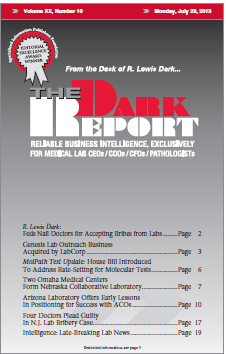FEW PATHOLOGISTS OR CLINICAL laboratory directors would argue against revising the current Medicare payment policies for molecular and genetic tests. A bill proposed in Congress would do just that. The process now in use by Medicare Administrative Contractors (MACs) is inefficient and opaque, according to pathologists and lab executives. The result is not many clinical …
House Bill Introduced to Address Rate-Setting for Molecular Tests Read More »
To access this post, you must purchase The Dark Report.


